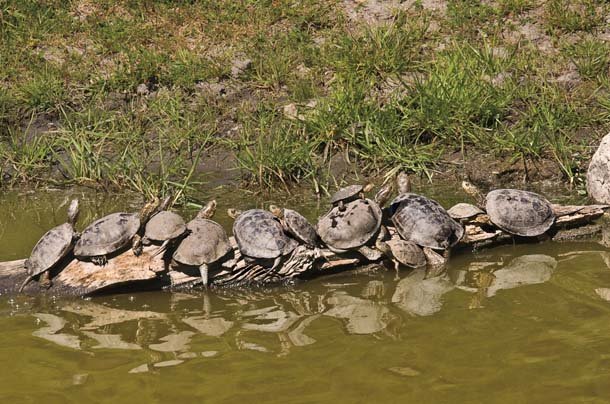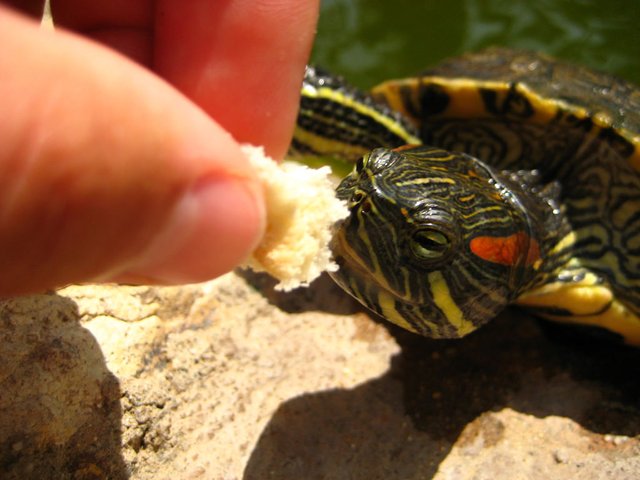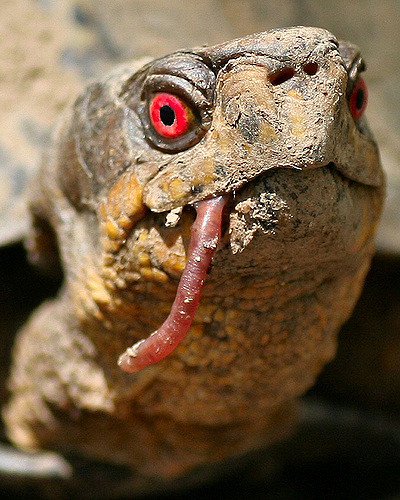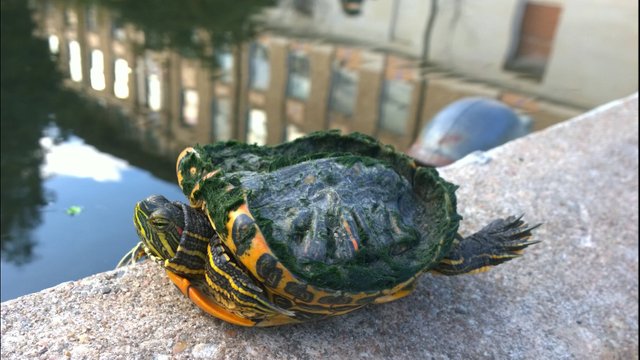Can You Feed Bread To Wild Turtles?
I am lucky enough to live only a few blocks from Newport News Park, one of the largest state parks in Virginia. At more than 8,000 acres, Newport News Park is filled with a huge variety of wildlife, including large populations of reptiles and amphibians. Turtles especially are incredibly common in the park; snapping turtles, mud/musk turtles, and a number of slider species call the central lake their home. In the heat of summer, you can find dozen of these pond turtles basking near the shores and bridges with relatively little effort.

People come to visit the park for many reasons, but some come to see these turtles specifically; feeding the park's turtles is a popular draw for many visitors. As soon as people toss food into the water (most notably bread), massive numbers of turtles congregate near the bridges and banks to eat, much to the delight of visitors. Although they do show an interest in human food such as bread, an important question arises: is it actually okay to feed bread to turtles (wild or domestic)?

The short answer is no. Turtles are omnivores and eat a wide variety of insects/arthropods, worms, fish and vegetation (our facility feeds our turtles crickets, cockroaches, worms, bull minnows, crayfish, fruits, squash and vegetables in addition to their commercial turtle food). Bread should never be included in their diet because turtles lack the enzymes needed to break down foods like bread (or those that contain dairy). Since they cannot properly process these foods, the turtles do not obtain the vitamins and nutrients they require for proper growth and development.

So if the bread isn't good for the turtles, why do they eagerly gather to eat it? It's because they are wild animals, and wild animals will make use of any food they can find to survive. The turtles see the offered bread as an easy meal, which they will happily take advantage of (even if they can't properly digest it). A turtle eating bread on occasion would not be the worst thing in the world (certainly not ideal, but the bread wouldn't kill it); they can sustain themselves on bread for quite a long time, but their diet will be severely lacking in the necessary nutritional components and this will heavily impact their health. The bigger problem is that these turtles often become reliant on people; as they are fed they will look for food less on their own (or even entirely) and simply wait for people to feed them. And because they are eating nothing but bread, these turtles' health will decline rapidly. You can see the negative affects quite easily; next time you are at a park (especially one where people feed routinely feed turtles) you may notice their shells appear lumpy or malformed. Without essential nutrients, the turtles cannot maintain proper shell growth.

Even captive turtles need an omnivorous diet free of bread (just because they will eat it doesn't mean it's what they should be eating). Though they may not be living in the wild, they are not equipped to properly process human foods. A poor diet (especially once lacking in calcium) will inevitably lead to health problems such as metabolic bone disease that can ultimately be lethal to your pet.

It's understandable why people enjoy feeding turtles and wild animals. It's fun to watch them eat up close and we feel good; we believe we are helping them. But while our intentions may be good, our actions can result with negative consequences. Fed animals become less scared of people, or even completely reliant, and endanger themselves by coming too close to us. Their presence can result in safety concerns (for humans and the animal), property damage, or even contribute to the spread of contagious diseases. In general, it's best not to feed ANY wild animal, turtle or otherwise. They are equipped to find their proper food in their own ecosystem, and they are not, nor ever have been, reliant on humans. These awesome animals have survived for millions of years without our assistance, and will live longer, healthier lives if we observe them from a distance!
Unfortunately, there is very little that can be done, except educating people! (which is what you do :) )
What about hot dogs? When I go fishing near my house the turtles in the pond always steal my hot dogs... I'm not sure if it is good for them, but they sure love it!
I almost included hot dogs! One of our rescue box turtles was fed nothing but hot dogs by his previous owners for years (we now call him "Hot Dog").
Hot dogs are like bread; definitely not ideal and a long term diet of hot dogs is definitely not good, but if they are only getting a little now and then, its not going to be the end of the world (plus if they are stealing them off your line, you can't do a lot to stop 'em!). Though it is meat, it is processed and still doesn't provide them the many nutrients they require.
Does the fact that they are beef hot dogs make a difference? Only the finest hot dogs for my fishing bait! Haha just kidding, the pork/chicken hot dogs don't stay on the hook, only the beef ones do! :)
In theory, they might be better than bread since they are meat, but processed meats that have a high salt content (hot dogs definitely fall in this group) are full of sodium and fat that can lead to organ problems and shell deformities. So the meat isn't really a problem...its just all the crap we add to our food! xD
@jrcornel its not good for them T.T
cabbage or cacti - they love that cucumber?
While not a turtle, one of my most disturbing childhood memories was of seeing a seagull swallow a whole dinner roll. It lodged in it's neck and made a visible lump. Not sure what happened to the bird, hopefully it survived.
I'm owning a turtle. I can't imagine if he eats something else but his special food. He doesn't eat anything else, just his special food for turtles. And thanks God it is like that :D
Good article, new facts for me ;)